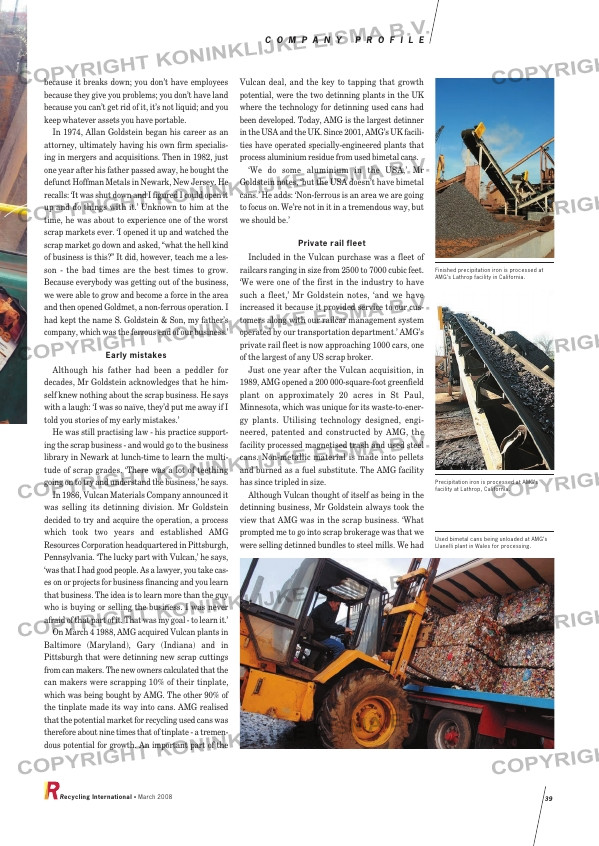Page 39 from: March 2008

because it breaks down; you don’t have employees
because they give you problems; you don’t have land
because you can’t get rid of it, it’s not liquid; and you
keep whatever assets you have portable.
In 1974, Allan Goldstein began his career as an
attorney, ultimately having his own firm specialis-
ing in mergers and acquisitions. Then in 1982, just
one year after his father passed away, he bought the
defunct Hoffman Metals in Newark, New Jersey. He
recalls: ‘It was shut down and I figured I could open it
up and do things with it.’ Unknown to him at the
time, he was about to experience one of the worst
scrap markets ever. ‘I opened it up and watched the
scrap market go down and asked, “what the hell kind
of business is this?” It did, however, teach me a les-
son – the bad times are the best times to grow.
Because everybody was getting out of the business,
we were able to grow and become a force in the area
and then opened Goldmet, a non-ferrous operation. I
had kept the name S. Goldstein & Son, my father’s
company, which was the ferrous end of our business.’
Early mistakes
Although his father had been a peddler for
decades, Mr Goldstein acknowledges that he him-
self knew nothing about the scrap business. He says
with a laugh: ‘I was so naïve, they’d put me away if I
told you stories of my early mistakes.’
He was still practising law – his practice support-
ing the scrap business – and would go to the business
library in Newark at lunch-time to learn the multi-
tude of scrap grades. ‘There was a lot of teething
going on to try and understand the business,’ he says.
In 1986, Vulcan Materials Company announced it
was selling its detinning division. Mr Goldstein
decided to try and acquire the operation, a process
which took two years and established AMG
Resources Corporation headquartered in Pittsburgh,
Pennsylvania. ‘The lucky part with Vulcan,’ he says,
‘was that I had good people. As a lawyer, you take cas-
es on or projects for business financing and you learn
that business. The idea is to learn more than the guy
who is buying or selling the business. I was never
afraid of that part of it. That was my goal – to learn it.’
On March 4 1988, AMG acquired Vulcan plants in
Baltimore (Maryland), Gary (Indiana) and in
Pittsburgh that were detinning new scrap cuttings
from can makers. The new owners calculated that the
can makers were scrapping 10% of their tinplate,
which was being bought by AMG. The other 90% of
the tinplate made its way into cans. AMG realised
that the potential market for recycling used cans was
therefore about nine times that of tinplate – a tremen-
dous potential for growth. An important part of the
Vulcan deal, and the key to tapping that growth
potential, were the two detinning plants in the UK
where the technology for detinning used cans had
been developed. Today, AMG is the largest detinner
in the USA and the UK. Since 2001, AMG’s UK facili-
ties have operated specially-engineered plants that
process aluminium residue from used bimetal cans.
‘We do some aluminium in the USA,’ Mr
Goldstein notes, ‘but the USA doesn’t have bimetal
cans.’ He adds: ‘Non-ferrous is an area we are going
to focus on. We’re not in it in a tremendous way, but
we should be.’
Private rail fleet
Included in the Vulcan purchase was a fleet of
railcars ranging in size from 2500 to 7000 cubic feet.
‘We were one of the first in the industry to have
such a fleet,’ Mr Goldstein notes, ‘and we have
increased it because it provided service to our cus-
tomers along with our railcar management system
operated by our transportation department.’ AMG’s
private rail fleet is now approaching 1000 cars, one
of the largest of any US scrap broker.
Just one year after the Vulcan acquisition, in
1989, AMG opened a 200 000-square-foot greenfield
plant on approximately 20 acres in St Paul,
Minnesota, which was unique for its waste-to-ener-
gy plants. Utilising technology designed, engi-
neered, patented and constructed by AMG, the
facility processed magnetised trash and used steel
cans. Non-metallic material is made into pellets
and burned as a fuel substitute. The AMG facility
has since tripled in size.
Although Vulcan thought of itself as being in the
detinning business, Mr Goldstein always took the
view that AMG was in the scrap business. ‘What
prompted me to go into scrap brokerage was that we
were selling detinned bundles to steel mills. We had
Recycling International • March 2008 39
C O M P A N Y P R O F I L E
Used bimetal cans being unloaded at AMG’s
Llanelli plant in Wales for processing.
Precipitation iron is processed at AMG’s
facility at Lathrop, California.
Finished precipitation iron is processed at
AMG’s Lathrop facility in California.
RI_027 Comp. profile:Opmaak 1 28-02-2008 13:28 Pagina 39



